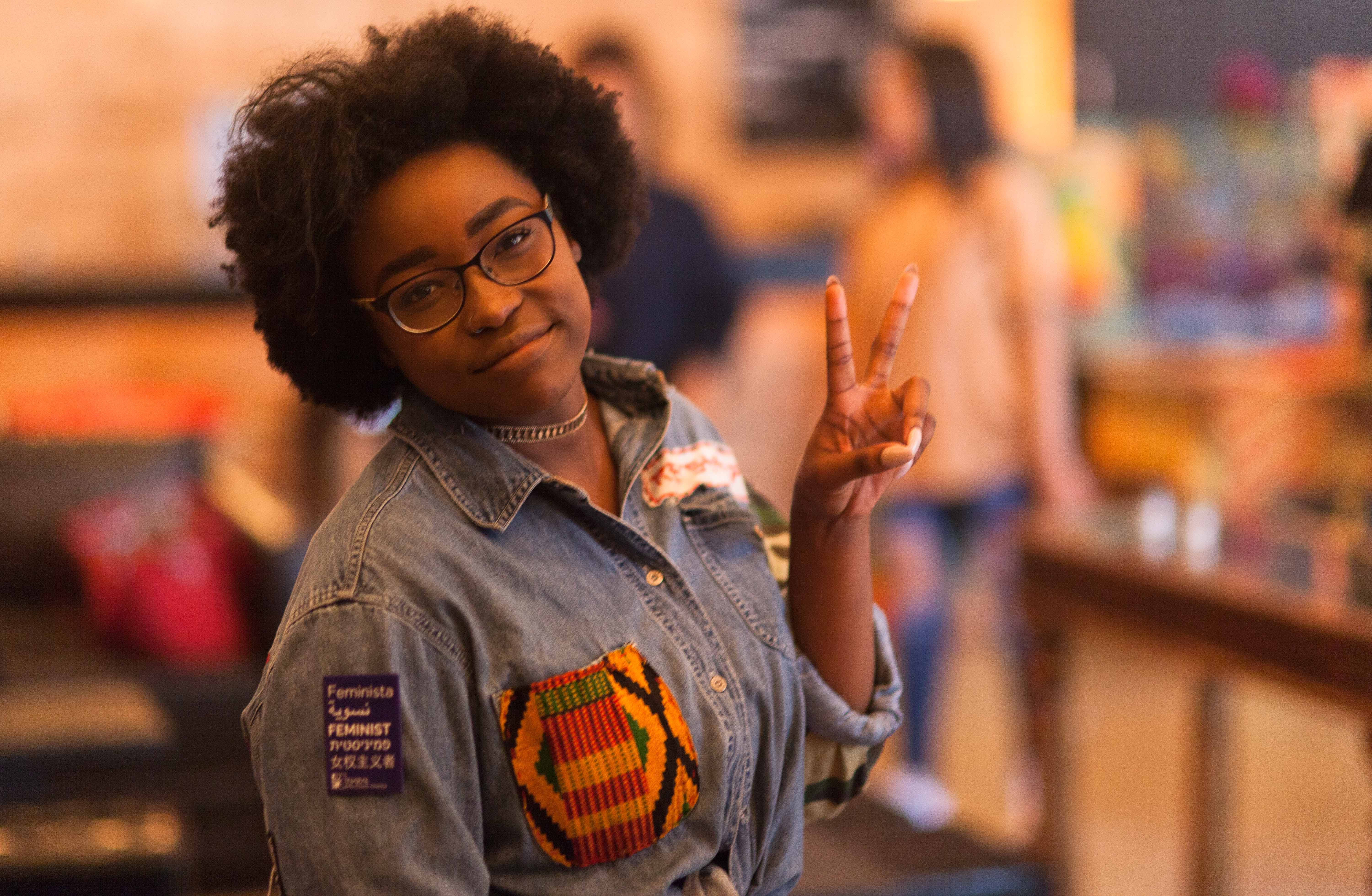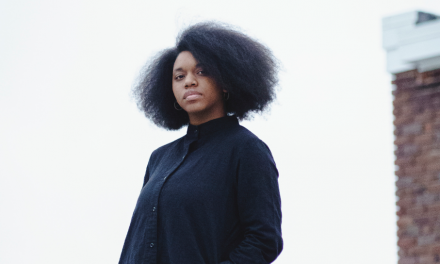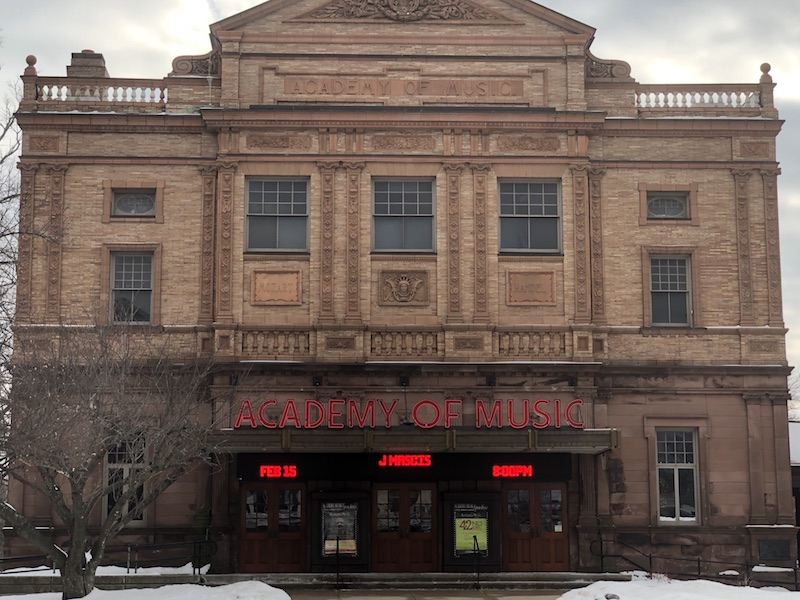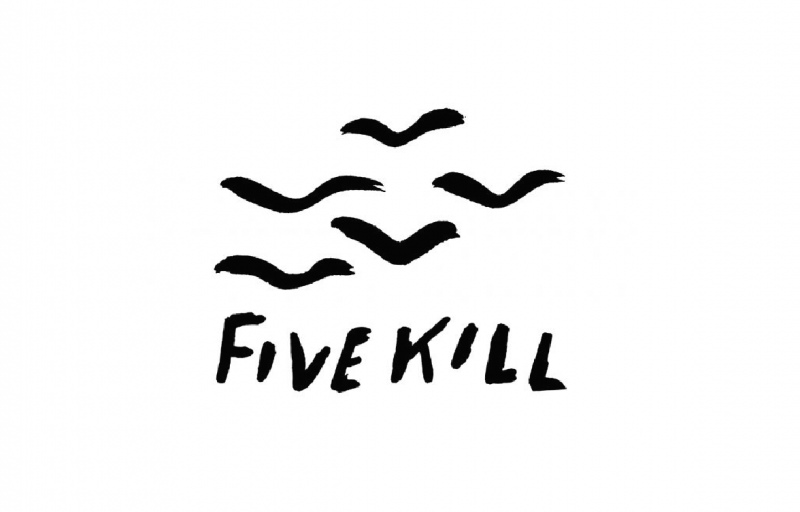This article first appeared in The Alt on July 12, 2017.
Photos by Kenneth Newman
“Untitled is what it says it is. As a people, we always get a label put on us,” says Kilijah Crumpler, one of the founding members of the creative collective #Untitled. “We’re young,” he says. “That’s a label. We’re black. That’s another one.”
“Another one,” says Kat Carter, the diminutive co-founder of #Untitled, doing her best DJ Khaled impression. (Carter was born as Kathya Richards — she takes her name from Shawn Carter, better known as Jay Z.) Everyone takes a moment to giggle.
“The fact that you need to put a label to put relevance on your life — that’s restrictive,” says Crumpler, earnestly.
We have taken over a corner of The #Untitled Experience, the ambitiously named soft launch for #Untitled’s website. Chill R&B music plays in the background. There are artists painting in a live-painting session just a few feet away — David DiPasquale and Megan Ruch, local artists who were recruited for this event, are holding court, happily entertaining the questions of anyone interested enough to ask them something. DIY vendors line the walls, selling designer t-shirts, caps, hoodies.
Aji Njie, member of #Untitled, continues: “We wanted to create a different vibe, so that everyone can feel welcome. Nowadays all the groups are stereotypical. You have to have a certain characteristic to be part of something. We accept everyone. There’s nothing that would exclude you from being part of Untitled.”
#Untitled started in the summer of last year, as an artist’s collective specifically designed for creatives of color. It started, as do so many things, with conversations between friends. Carter, Crumpler, Njie, Malaika Iyok, Akiva Benbow, Kedeara Smith, and Wayne Brown, friends who met through Hudson Valley Community College’s Black & Latino Student Union (BLSU), would gather at Troy Kitchen regularly, to talk and dream about the work they wanted to do, about their artistic visions. They were dreams then–unformed ones. More aspirational than anything else.
But they knew a few things. They liked poetry. They liked performing it at Troy Kitchen. They liked fashion. They liked music. They wanted careers in these fields.
And they also knew that a creative career path would be difficult to achieve.
For one, they faced family pressure.

Iyok, a founding member of the collective, is the daughter of African immigrants — her mom is from Tanzania, her dad from Cameroon — and the expectation was that she go to to school for accounting. “I was good at accounting, but I hated the thought of having to sit there and do this tedious work all the time,” she tells me, laughing. “Coming all that way, they’re not telling you to come here and pursue your dreams. They’re telling you to make money, so you can send money back home, so you can provide for everyone who is here.”
“For me to even feel like I could do fashion was an absolute joke,” she says, taking on a serious note. But Iyok, who aspires to be a stylist, had a passion for the fashion industry that couldn’t be quelled by her family’s ambitions for her. She transferred into a more appealing major — communications at UAlbany — over the objections of her father, and found her way to Mission Accomplished Transition Services’s (MATS) Fashion Edition, which is a professional mentorship program for young adults who have a desire to work in the fashion industry.
Second, there’s the pressure you put on yourself, when you come from a minority community, to do something with your life that will return dividends of stability and financial security.
”I’m supposed to be in the Air Force right now,” says Carter, laughing. “Because that’s my passion, right?” she asks, sarcastically. She shakes her head. “After high school, I got into civil engineering and kind of hated it.”
It was only after a few semesters of struggling through math and physics classes that Carter discovered her true passion — event planning, which she now studies. It’s a step removed from the sure-fire bet of a middle class career that a life in the service would have yielded, but it’s worth it for Carter, who eventually realized that her ambition in life was to “bring people together, to be the bridge for creatives who don’t know each other.”
And for a third, there’s the racism that young black creatives — young black anythings — face, in a world dominated by white faces in white places.
It’s a struggle that #Untitled’s young creatives are well acquainted with. “At some point or another, we’ve all been excluded from something in our lives we’ve wanted to be part of,” says Crumpler. It’s not a secret that African-Americans and other racial minorities are underrepresented in the higher echelons of the workforce; The Center for American Progress reported this in a 2012 brief. It’s also not a secret that African-Americans and Latinos are concentrated in the less-prestigious colleges and universities, and as a result suffer worse prospects for their employment; The Atlantic reported on this in 2015. Government studies reliably show that the unemployment rate for African-Americans is double that of white Americans, that the accumulated wealth of black people in this country is minimal, compared to that of whites. A 2012 report from the US Bureau of Labor Statistics found unemployment rates for “black or African Americans” to be 13.8 percent with the rate being 7.2 percent among whites.
It requires a certain amount of bravery for any young, ambitious person of color to go up against those odds. And even more bravery when it’s a person of color trying for a creative career — fields that are well known for the lack of stability they offer.
That’s why many of the members of #Untitled are in school, earning their political science or business degrees on the side of their creative work. “Being young and black we’re going to need credentials,” says Njie.
Back at the launch party, “Bitch Better Have My Money” starts playing, and Carter sits up straight, listening tensely. She sags down into the loveseat, smiling in relief, when the song is abruptly stopped — when something less caustic is put on.
Everyone laughs when they realize what happened.
“It’s always Rihanna,” someone says, with a smile on their face. It’s true, the song is a bit abrasive for this gathering.
“Can’t take Rihanna anywhere,” says Carter, grinning, rolling her eyes playfully.
“Labels tend to be extremely restrictive,” Crumpler says, ignoring the interruption. “We’re trying to create an area where there are no boundaries.” The freedom to define yourself how you want is treated extremely seriously, in #Untitled — it is even extended to the genre in which the artists belong. “Somebody saying they’re a painter — that puts a label on them. They could be anything; a painter, an artist, a rapper. But because they’re a painter, that’s all they’re recognized for, when there’s a ton of things they could be,” continues Crumpler.
This extreme aversion to labels might strike an outside observer as a little excessive, a little forced. If you’re so determined to be nothing like what has come before, what exactly are you trying to be? But the indeterminate nature of #Untitled — the amorphousness, the unclear boundaries and lack of hierarchical structure — that is the point. These creatives have faith that if you build a correct foundation, if you perfect the conditions in which creative flourishing may occur, creatives will come, and they will grow.
This philosophy guides the first aspect of #Untitled’s work — the collective intends to be a networking hub for young creatives, especially young creatives of color. “Our main goal is to bring creatives together, in any aspect of the field they’re in — with any aspect of the help they need,” says Carter.
“If a designer needs a photographer they should be friends. And if they don’t know anyone professional enough, we want to be there to bridge them,” Iyok adds.
“We’re the bridge to greatness,” says Carter, grinning.
And genuine networking is happening all around us at the launch party. “Models have come in, and photographers have come in, and connections have been made,” says Iyok. #Untitled is already fulfilling its mission.
There are, of course, networking events for creative people in the Capital Region — specifically, there Upstate Alliance for the Creative Economy’s (ACE) creative freelancer networking events. But #Untitled’s crew is more than aware of the competition. “I’ve been to one of ACE’s networking events,” says Iyok, shrugging. “The aesthetic of the situation is geared towards other white people,” she says, adding that she’s often the only person of color or black person there. “I don’t know if they’re judging me or something, I just don’t feel comfortable.”

There’s a standard of professionalism required in an event like ACE’s, Crumpler tells me, that won’t be required at an #Untitled networking event. “The way these programs are designed — it might exclude some people.” He points to himself. “I can walk into a certain type of place, because I’m a professional. But certain people might not have the same experience, because they’re not professional. And I think that’s kind of ridiculous,” he says.
“Just because they’re not professional doesn’t mean they’re not great!” says Carter, passionately.
Given the critique of ACE that #Untitled offers, you’d think that there would be some pushback from the larger organization. But in actuality, Maureen Sager, executive director of ACE, has nothing but praise for the young entrepreneurs. “Kat and Malaika have a really strong, clear vision for themselves and for #Untitled,” says Sager, who worked with Carter and Iyok through MATS, and who has hired Carter to be her assistant event planner. “They’re inspiring their friends to create, and they’re inspiring me to find more opportunities for young people in our region.
The second major aspect of #Untitled’s work is community service: giving back to the community from which #Untitled’s members came. This takes on an explicitly political edge for #Untitled’s members; this is yet another way that #Untitled distinguishes itself from ACE — the latter is largely apolitical in its focus, according to Sager. But as a collective borne from the black community, #Untitled doesn’t have that luxury. “Of course there’s politics in creative work,” says Wayne Brown, member of the collective, with an air of bemusement. “We want the freedom to do what we want creatively. These are fights we’re going to have every day. We don’t really have a choice.”
“If we want people like us to live the way they want to live, and celebrate their lives the way they want to, we need politics,” says Brown.
Politics can mean different things to different members.
“We’re teaming up to do things in the community — trying to bring back the swimming pools in Troy,” says Iyok. #Untitled’s various members are raising money to reopen the pools, and awareness about their closure.
It can also mean Njie’s campaign, entitled I’m Not Too Pretty for Dark Skin, which she is trying to bring to summer camps in urban areas, to fight colorism within the black community and outside of it. “That’s one thing that happens, when people like me go out,” she tells me. “They say ‘Oh, you’re pretty for a dark skin. Why use that terminology? I want every person to feel comfortable in their own skin, so later on in life, you don’t feel excluded, like we did.”






I absolutely loved this article and adore the moves this collective is making. I can relate on so many levels. My patent lawyer were also immigrants and I too chose to push aside my creative dreams and aspirations to pursues more conventional career paths. These young ones are doing what makes gen happy and that’s so admirable. Thank you for choosing to write this article and thank you to #Untitled for sharing your gifts and your story. I do wish there was contact information or something provided. Other than that, it was a great article!